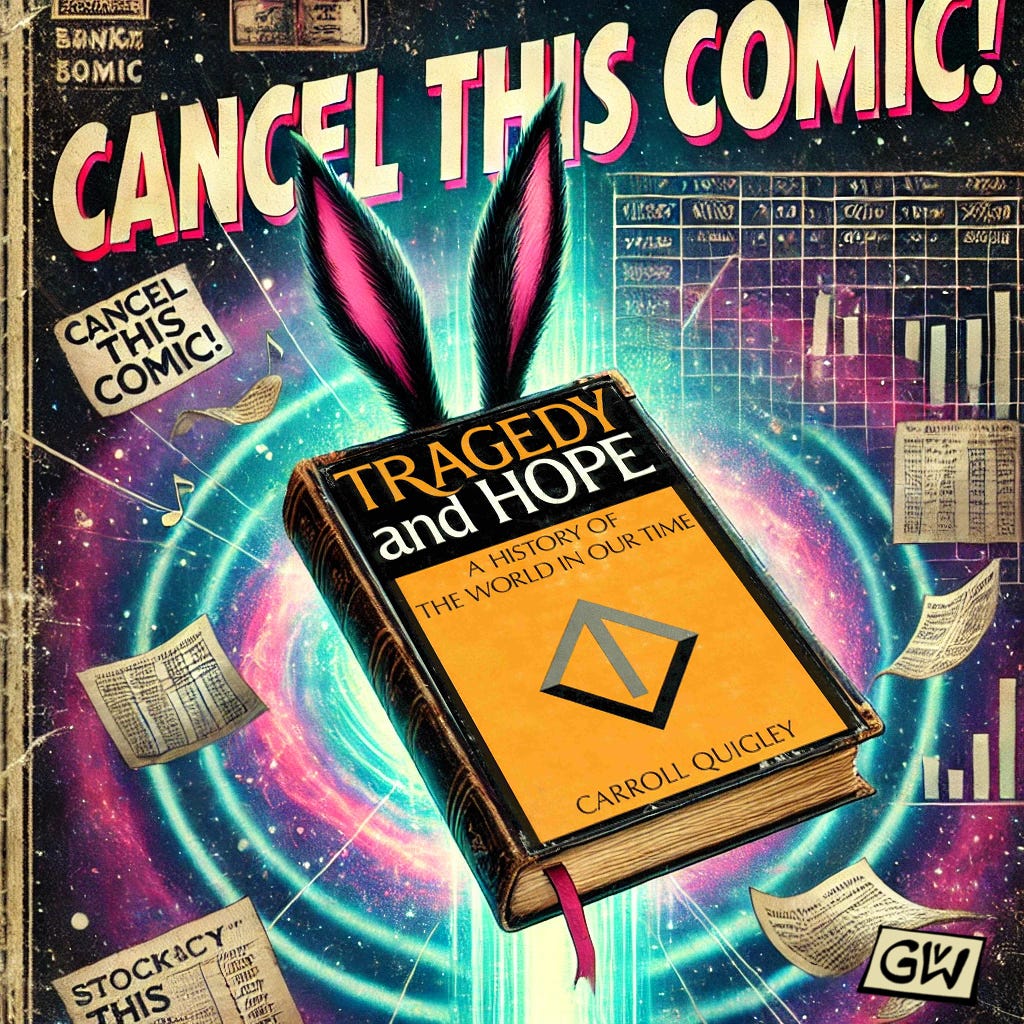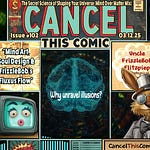Alright, you history dropouts, policy parrots, and algorithmically farmed attention spans—let’s talk about a book they buried…
Not a conspiracy theory, not some fringe manifesto—this came straight from the guy who trained the people running the show.
Carroll Quigley. Georgetown professor. Deep-state historian. Mentor to presidents. They gave him access, he wrote it down—then they made sure nobody read it.
Before the scroll, there was the page. Before they fed you an endless stream of bite-sized nothing, you had an attention span. You used to read.
🎧 [Beat locks in—fast, hypnotic, urgent. The book opens. The history floodgates break.]
You had the attention span once. Find it again.
🎶 [The track ignites. The past isn’t buried—it’s right here.]
🎙️ FrizzleBob vs. Carroll Quigley: The Canceled History Debate They Don’t Want You to Hear
A Mind-Bending Conversation on Power, Control & The Blueprint for the Modern World:
Imagine you found a way to argue with your old history professor—even after he’s been long canceled by academia. Sounds impossible? Not when you bend the very fabric of reality.
Today, we’re breaking into "Tragedy and Hope", the forbidden textbook of power. The book they didn’t want you to read. The blueprint for how the world is actually run—straight from a man who saw behind the curtain.
Professor Carroll Quigley. Georgetown insider. Mentor to Rhodes Scholars, future presidents, and the global elite. The guy who taught the system how to sustain itself—before they erased his work.
But guess what? I found a backdoor into history.
Quigley and I are about to throw down in a cross-dimensional debate on finance, control, secret networks, and why every revolution is just a franchise operation.
💥 Brace yourselves. This ain’t just history. This is how the game is played.
Fractal FrizzleLyrics
FrizzleBob here—metaphysical rabbit detective, deep-state archivist. This ain’t a theory. It’s Quigley’s own words.
The people who built the world’s power structures gave him access. He wrote it down. Then they buried the book.
Carroll Quigley: “Tragedy and Hope” (1966)
Carroll Quigley, professor of state,
Taught Georgetown’s finest who’d legislate.
His students? Rhodes Scholars, global elites,
CFR operatives, Wall Street chiefs.
Not an outsider, not some rogue,
Quigley had clearance—the inside code.
And what did he find?
1877, Cecil Rhodes,
A vision of empire, control unfolds.
Wealth from mines, gold and land,
A secret society—an invisible hand.
Not speculation, not a guess,
Rhodes wrote it down—it’s all confessed.
And it didn’t stop there.
1891, the network expands,
Alfred Milner takes command.
South Africa’s gold, the Bank of England,
Finance and war—tightly intermingled.
By 1910, the Round Table’s here,
London to New York, a century steered.
The money moves, the world follows.
1902, the Pilgrims rise,
J.P. Morgan, Rhodes’ allies.
Anglo-American ties,
Power shared, no surprise.
1913, the Fed takes hold,
Private bankers, money controlled.
House of Morgan, Rothschild ties,
A system designed so credit decides.
Not elected, not debated,
A structure built—consolidated.
And then—war.
World War I? A test run.
Britain, France, the USA,
Lines get drawn, but debts remain.
Who profits? The ones who lend,
War ends, but payments extend.
Versailles signs, the stage is set,
The League of Nations—one more bet.
But America wasn’t ready. Yet.
1930s, Depression hits,
Markets crash, but who submits?
CFR, Council elite,
Shaping policies, drafting speech.
By ‘45, the war is done,
A new world order? Already spun.
Not paranoia—Quigley taught it in class.
1950s, the next phase runs,
Military budgets—Cold War funds.
Containment doctrine, Truman’s plan,
Marshall money, NATO’s hand.
1954, Bilderberg’s door,
Post-war elites, planning once more.
Quigley’s themes, still in play,
The network grows, no decay.
And Quigley admitted it.
“The argument that the two parties should represent opposed ideals… is a foolish idea… instead, they should be almost identical.”
That’s his quote. Page 1247.
And where are we now?
1970, Tragedy’s out,
Published facts—but drowned in doubt.
One print run, then no more,
Libraries lose it, out the door.
Rhodes’ vision? Still intact,
Trade deals, debt—a quiet pact.
So what’s the lesson?
Bill Clinton, Georgetown days,
Quigley’s lessons, set his ways.
Modern proof, the threads connect,
The system lives, still unchecked.
Before the scroll, there was the page.
Books built minds. Algorithms farm them.
You had the attention span once.
Find it again.
Reading was your first rebellion.
You used to read.
Remember?
FrizzleBob out.
FrizzleSources
http://www.carrollquigley.net/
“Tragedy and Hope”
A History of the World in Our Time
"The hope for the twentieth century rests on recognition that war and depression are man-made, and needless. They can be avoided in the future by turning from the nineteenth-century characteristics just mentioned (materialism, selfishness, false values, hypocrisy, and secret vices) and going back to other characteristics that our Western Society has always regarded as virtues: generosity, compassion, cooperation, rationality, and foresight, and finding a increased role in human life for love, spirituality, charity, and self discipline."
(Carroll Quigley. Tragedy and Hope. 1st ed. 1966. p. 1310-1311)
Memorable FrizzleQuotes
"The argument that the two parties should represent opposed ideals is a foolish idea. Instead, they should be almost identical."
"And they who control the credit of the nation direct the policy of governments and hold the destiny of the people in their hands."
(Statement by Reginald McKenna on the power of the banks)"The fusion of loyalty to the Emperor and submission to militarism into a single loyalty which no Japanese could reject without at the same time rejecting his country, his family, and his whole tradition."
(Description of Japanese militarism)"Economically, this method of fighting depression is not essentially different from the method listed above under destruction of goods, for in both cases economic resources are also diverted from constructive activities or idleness to production for destruction."
(On the economic effects of defense spending)
https://archive.org/details/TragedyAndHope_501/mode/2up?view=theater
🎶 📚 Blackmail, Billionaires & The Shadow State – FrizzleBob Reads Whitney Webb and Ryan Dawson (Deep State Blues)
FrizzleTune #029 – The Secret Economy of Blackmail, Surveillance & Global Control. The Real Story Behind Epstein, Roy Cohn & the Intelligence-Organized Crime Nexus (Pam Bondi HOPIUM Mix)...

















Share this post